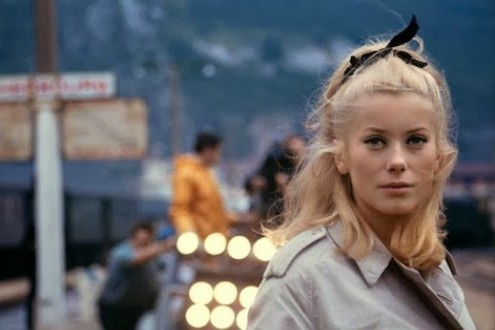In the 1950s Paris saw itself as the world’s trendsetter. There was cafe life, existentialism, jazz, haute couture and -cuisine but then came the Beatles and suddenly England swung like a pendulum do. In film France gave us the Nouvelle Vague of Truffaut and Godard and, yes Jacques Demy. His work, however, was eclipsed by other Europeans working in sixties London like Polanski and Antonioni, and by Britain’s own Kubrick and Schlesinger.
Demy’s most famous film – a real worldwide crossover hit – was The Umbrellas of Cherbourg of 1964. It’s catchy, ear-worm Michel Legrand theme song was immortalised as lift muzak. The movie is now curio but when it was released it was a startling introduction to the new decade. It’s a romance – a young (teenage-looking) shopgirl played by Catherine Deneuve loves car mechanic ( Nino Castelnuovo). What’s so special is that it’s a jazz opera – all the dialogue is sung. Startling too; it’s almost a prefiguring of Pop Art in the colours of the sets and costumes, the umbrella shop and the Esso garage in the snow. It was wonderfully quirky then, as now, has an adorable kooky retro vibe that remains irresistible.
The semi-autobiographical Lola (1961) was Demy’s debut movie in which Anouk Aimée plays chantoose in the port city of Nantes (the director’s hometown). Although in black and white the film sings with Demy’s signature style (available light, startling juxtapositions like the white Cadillac in the grey docks) which creates a dreamscape of the ordinary. Lola entices an American sailor in a cabaret that’s straight out of Brecht. Like many of his characters Lola and the sailor are vague outcasts dreaming of a better life as are the besotted and benighted gamblers in Bay of Angels (1963) shot (like much of Demy’s work in real locations) on the French Riviera.
Claude Mann discovers he has a lucky gift at the roulette table and upgrades from his local, municipal casino (a notch above bingo) to the high rollers in Cannes and Monte Carlo. He meets the less lucky, bottle-blonde Jeanne Moreau (elegant in Pierre Cardin but still looking like a cut-price Marilyn) who is so addicted to the spin of the wheel that when she loses all her money she has to sleep in the railway station waiting room.
“I don’t love money,” she says illuminating her addiction. “If I did I wouldn’t squander it.” She carries a toy roulette wheel in her handbag to play when the casinos are closed on Sundays. As the relationship develops there’s a real insight into the addled mind of the junkie gambler.
Young Girls of Rochefort (1964) is almost a sequel to Umbrellas with Deneuve and her sister Françoise Dorléac who inhabit a sugary world that seems to be made of French fondant icing. Just as you’re thinking the all-singing and -dancing movie is a homage to Gene Kelly musicals up pops the original American in Paris himself. And George Chakiris (hotfoot from West Side Story is the lead dancer). It’s all exuberant, absurdist fun laced with bitter-sweetness, a Demy hallmark. There’s dancing in the street, summery dresses, Legrand songs and enough French sailors to keep Jean-Paul Gaultier happy well into his retirement. To say that Demy’s candy-coated musicals are insubstantial froth is unfair. They are heartfelt stories where happy endings are not guaranteed and also a wonderful slice of Gallic whimsy.
Two more movies are also included (along with a shedload of extras) in this superbly restored box set. Donkey Skin (1967) is a Cocteau-esque fairytale featuring Deneuve and Jean Marais. Again there is a bizarre colour scheme that gives the film a garish medieval, illustrated-manuscript feel. Une Chambre de Ville (1982) is Demy back on musical form. The streets of Nantes are riven with strikers. Dominique Sanda swaps demeaning husband for earthy son of toil. The film is a rekindling of Demy’s early musicals but without the sugar-coating. It’s a little stagey however and lacks the brio of the Legrand score.
Available on Blu-ray Mon 17 Feb 2020
